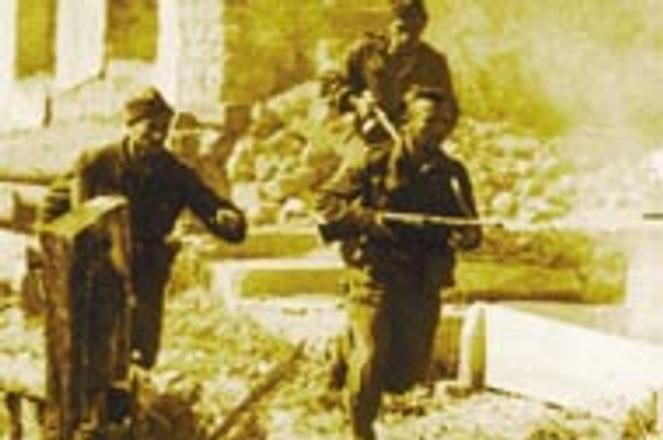Heroes or traitors? The Slovak National Uprising of August 29, 1944, has long been disputed by communist and nationalist interpreters - the former call it a victory against Nazism, the latter say it was treason.TASR
The Slovak National Uprising (SNP), which began on August 29, 1944 is a part of Slovak history that has excited controversy for over 50 years. In its simplest telling, the uprising was led by 18.000 Slovak partisans who fought alongside 60,000 Czechoslovak soldiers against the German troops protecting the Slovak government of President Jozef Tiso. During World War II, Tiso was a Nazi puppet ruler who managed to keep Slovakia out of the war by making concessions to the Germans.
The meaning of the SNP, however, has always been disputed. Since the uprising meant the end of the first ever Slovak nation, Slovak nationalists have often regarded it as a foreign-inspired act of treason against a legitimate Slovak state. Communist interpreters, on the other hand, have hailed the SNP as a socialist victory against the evil of Nazism that led straight to the 'Victorious February 1948' and the communist takeover of Czechoslovakia.
"The issue of the SNP has not yet been resolved by Slovak historians, whether they are nationalists or ex-Marxists," said Mark Stolarík, Chair of Slovak history at Ottawa University. Stolarík, who is also Director of the Canadian Slovak League, told The Slovak Spectator that "both sides are driven by rival ideologies rather than by an objective search for the truth. We may have to wait another generation, when passions have cooled, to get an objective treatment of the SNP."
One of the most balanced recent treatments of the uprising is historian Stanislav Kirschbaum's 1995 study "A History of Slovakia: The Struggle for Survival." Kirschbaum, a Canadian Slovak who teaches political science at Toronto's York University, offers a 40-page treatment of the wartime Slovak state and the SNP which is summarized below.
Until the beginning of World War II, Slovakia was a part of the first Czechoslovak Republic. On March 14, 1939 the Slovak Provincial Assembly proclaimed independence, and appointed the catholic priest Jozef Tiso as its president.
Slovaks did not greet the declaration of independence by dancing in the streets. The reason was principally that everyone understood that Slovak 'independence' was only guaranteed by German troops and the Treaty of Protection signed between the two states on 23 March.
It became increasingly obvious to many Slovaks, especially after the Soviet victory in Stalingrad in 1943, that their pro-Nazi government was leading the country to the loser's camp rather than the winner's circle. The allies had already recognized the exiled Czechoslovak government in 1941, so there was little hope that an independent Slovakia would survive the war.
During the summer of 1944, partisan warfare against occupying German troops broke out in various parts of Slovakia. Tiso looked to the Slovak army to deal with the partisans, but when he saw their reluctance to fire on their countrymen, he asked the Germans for help. With the murder of the German military mission during the night of August 27/28, Tiso got his wish: Germans troops arrived in Slovakia the next day, touching off the SNP.
Although the Germans thought the Czechoslovak Army would remain loyal to them, some 60,000 men actually joined the partisans, fighting in Banská Bystrica, in the heart of central Slovakia. The Allies supported the uprising with massive aid. The Soviet Union as well as United States flew tons of supplies into partisan territory. French troops participated in the actual battles. The partisan units totaled some 18,000 men, including foreigners.
After a major offensive by the Czechoslovak and Soviet armies in September, the Germans began bringing in reinforcements. The final German counter-offensive took place on October 17, with some 35,000 troops, launched from Hungary. Ten days later, Banská Bystrica fell. The army leaders were captured and perished in German concentration camps. The remaining Czechoslovak and Soviet groups were disarmed, but the partisans kept on fighting until the end of the war.
Some of the most painful aspects of the SNP for Slovaks then and now are the facts that Tiso sacrificed Jewish and Romany Slovaks for the sake of peace with the Germans. Those Slovaks who see him as a hero, as the leader of the first Slovakl state, must rationalize his betrayal of thousands of these Jews and Gypsies, his fellow citizens, as well as his decision to use German troops to put down an uprising of his own countrymen. On the other hand, the fact that Slovaks themselves put an end to the nation's dreams of statehood leaves a bitter taste in the mouths of nationalists.
Ivan Kamenec, a historian with the Slovak Academy of Sciences, said the first Slovak Republic would have disappeared even without the SNP because the Allies wanted all along to restore the old Czechoslovak Republic. "The fact that the SNP took place here did not influence or question this aim," he said.
Kamenec is convinced that the SNP should not be forgotten, and said Slovaks should not be distracted by the self-serving interpretive battles of democrats, nationalists and communists. "The SNP was a part of broader European anti-Nazi resistance, and Slovaks should take pride in that fact," he said.

